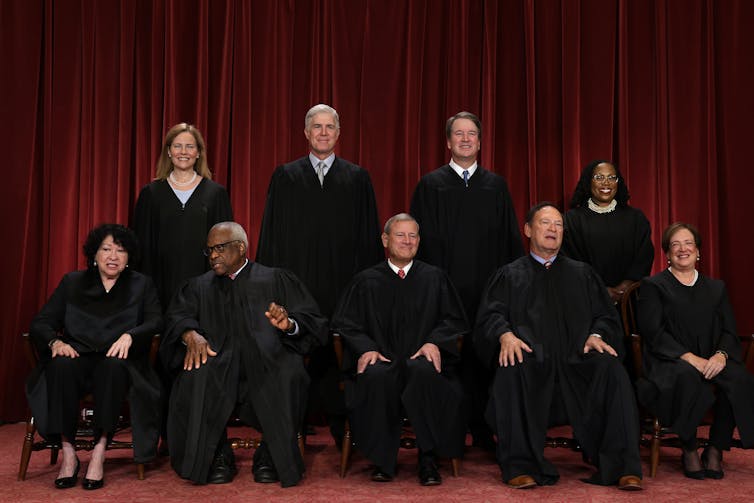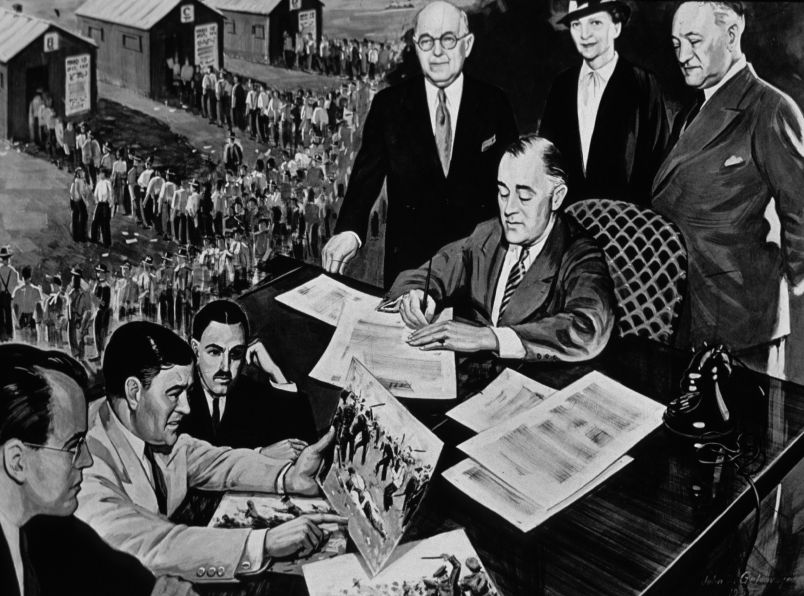This article is part of TPM Cafe, TPM’s home for opinion and news analysis. It was originally published at The Conversation.
Amazon, SpaceX, Starbucks and Trader Joe’s have all responded to allegations that they have violated labor laws with the same bold argument. The National Labor Relations Board, they assert in several ongoing legal proceedings, is unconstitutional.
SpaceX, for example, says that the NLRB is engaging in “an unlawful attempt … to subject Space X to an administrative proceeding whose structure violates Article II, the Fifth Amendment, and the Seventh Amendment of the Constitution of the United States.”
If these companies prevail, the entire process for holding union elections and for prosecuting employers who break labor laws — in place since the days of the New Deal — could collapse. That would leave U.S. workers more vulnerable to exploitation.
The Supreme Court upheld the constitutionality of the board nearly a century ago, soon after President Franklin D. Roosevelt signed the law that created the NLRB and made clear that workers have the right to organize and bargain collectively. Justices have also rejected similar arguments in cases involving other agencies.
As a law professor who researches labor law and constitutional law and a former labor organizer, I am deeply concerned, but not surprised, by these attacks on the federal agency that has protected U.S. workers’ right to organize unions and bargain collectively with their employers since the 1930s.
These corporations seem to believe they will find a sympathetic audience before the conservative justices that occupy six of the Supreme Court’s nine seats. In a series of prior cases, the conservative justices have already weakened administrative agencies and cut back on workers’ rights.
Growing support for unions
The corporate attack on the NLRB also seems to be a response to growing support for unions among Americans.
Workers at the companies that are challenging the NLRB’s constitutionality have all begun to organize unions in recent years, with numerous, high-profile, union-organizing wins. Workers across numerous sectors, including auto, education, health care and Hollywood, have recently held successful strikes.
What’s more, the NLRB has been more assertive in prosecuting employers for violating workers’ rights, and it has been revising rules in ways that make it easier for workers to organize.
For example, it has made it possible for the unionization process to move faster and has sought to quickly reinstate workers who are illegally fired for organizing unions, rather than waiting years for litigation to play out.
The Supreme Court and big business
This is not the first time that big business has tried to use constitutional law arguments in an effort to stop union organizing and limit workers’ rights.
From the 1890s to the 1930s, during what is known as the “Lochner era,” corporations argued that laws protecting workers’ rights, including the right to organize unions or be paid a minimum wage, violated their “freedom to contract” and exceeded Congress’ power under the Constitution.
Back then, the Supreme Court routinely sided with business.
It struck down hundreds of laws, including minimum wage laws, overtime laws and laws prohibiting child labor. It prohibited strikes, including in the railroad and mining industries. It allowed labor leaders to be jailed.
These rulings helped corporations grow wealthier and more powerful.
Only after mass uprisings by over 1 million workers, economic distress wrought by the Great Depression and overwhelming popular support for the New Deal did the Supreme Court finally change course, recognizing that it had made a mistake.
During the New Deal, the justices ruled that Congress has the power under the Constitution to pass minimum labor standards and to create agencies, such as the National Labor Relations Board, to protect workers and consumers.

Letting agencies make decisions
Now, nearly 100 years later, the NLRB’s foes contend that the labor board violates the separation of powers — the constitutional principle that the judicial, legislative and executive branches of government have distinct powers — because it mixes executive and judicial functions.
They also argue that the board is unconstitutional because presidents cannot fire the NLRB’s members or administrative law judges whenever they want.
And opponents of the NLRB claim that the use of administrative law judges — jurists who preside over and adjudicate cases regarding alleged violations of the law — violates the constitutional right to a jury trial.
But the Supreme Court has long permitted all of these features, not only for the NLRB but for other government agencies as well.
And for good reason.
No provision of the Constitution prohibits Congress from designing government agencies in this way. And Congress believed that these design choices would help the agency function well.
For example, by prohibiting presidents from replacing all of the NLRB’s administrative law judges for any reason or no reason at all, Congress sought to ensure independence of those judges.
Having each violation of law litigated before a federal jury, rather than administrative law judges deciding cases, could take a lot longer to resolve cases.
Assessing what’s at stake
If these corporations prevail with their constitutional challenges, the NLRB will no longer be able to function.
Currently, it can be very difficult for workers to organize unions, partly because of insufficient penalties and protections in labor law. But if the corporations win, there will no longer be an agency in place to safeguard workers’ rights to organize unions and to negotiate fair contracts with their employers.
Indeed, this threat goes beyond labor rights.
If the NLRB is found to violate the Constitution, other government agencies could be at risk as well, including the Securities and Exchange Commission, the Federal Election Commission and the Federal Trade Commission. In my view, that would endanger investors, voters and consumers — all Americans.
There is reason to believe the Supreme Court could side with big business if a lawsuit challenging the board’s constitutionality reaches it.
The Supreme Court in its current configuration is more pro-business than it has been in a century. The justices who make up its conservative majority have shown that they are willing to overrule long-standing labor precedents through decisions that have reduced union funding and restricted workers’ access to unions.
The conservative justices have also indicated that they may limit the powers of administrative agencies beyond the NLRB. Most notably, the conservative majority on the court recently crafted a rule known as the “major questions” doctrine, which says Congress must set particularly clear rules when it authorizes agencies to regulate on matters of political or economic significance.
Using this doctrine, the court has overturned a Biden administration regulation designed to protect the environment and has rejected its initial student loan forgiveness program.
The Supreme Court is hearing several other cases this year that threaten administrative agencies, including one that would allow courts to give less deference to reasonable agency rules and one that challenges the use of administrative law judges by the Securities and Exchange Commission.
Seeing room for optimism
There is no way to know for certain how the Supreme Court will rule on a case concerning the constitutionality of the NLRB or other federal agencies. There may not be enough votes to overturn years of well-established precedent, even among the conservative justices.
And on labor rights more generally, there is reason for optimism.
Workers are organizing in greater numbers than they have in decades. History teaches that when there is sufficient popular support for unions and workers’ rights, and sufficient mobilization among workers, the Supreme Court sometimes backs off and corporations give up their fight against workers’ rights.
Indeed, even Starbucks recently agreed to begin negotiating with its workers after years of illegally — according to the NLRB — refusing to bargain with them.
This article is republished from The Conversation under a Creative Commons license. Read the original article.







Eat the rich
Space contracts are very lucrative; it’s pretty much impossible not to make high-margin profits once the business infrastructure is in place. But Musk still feels the need to screw his employees, which really comes as no surprise.
TFG, having established the precedent of having citizen riots to attempt to change the outcome of elections, has opened the door to a citizen riot to change the makeup of the Supreme Court.
By “unconstitutional,” Amazon, SpaceX and others argue that the NLRB didn’t exist in 1787?
They have too many allies on SCOTUS, so this case may have legs.
It is more important than ever that we win this election, hold the White House and Senate, and hopefully flip the House, and obtain the breathing room to appoint more federal judges and dilute the power of recent Republican administrations’ appointees.
Otherwise, the continued dismantling of the administrative state, and the abridgment of personal freedoms, will continue apace.